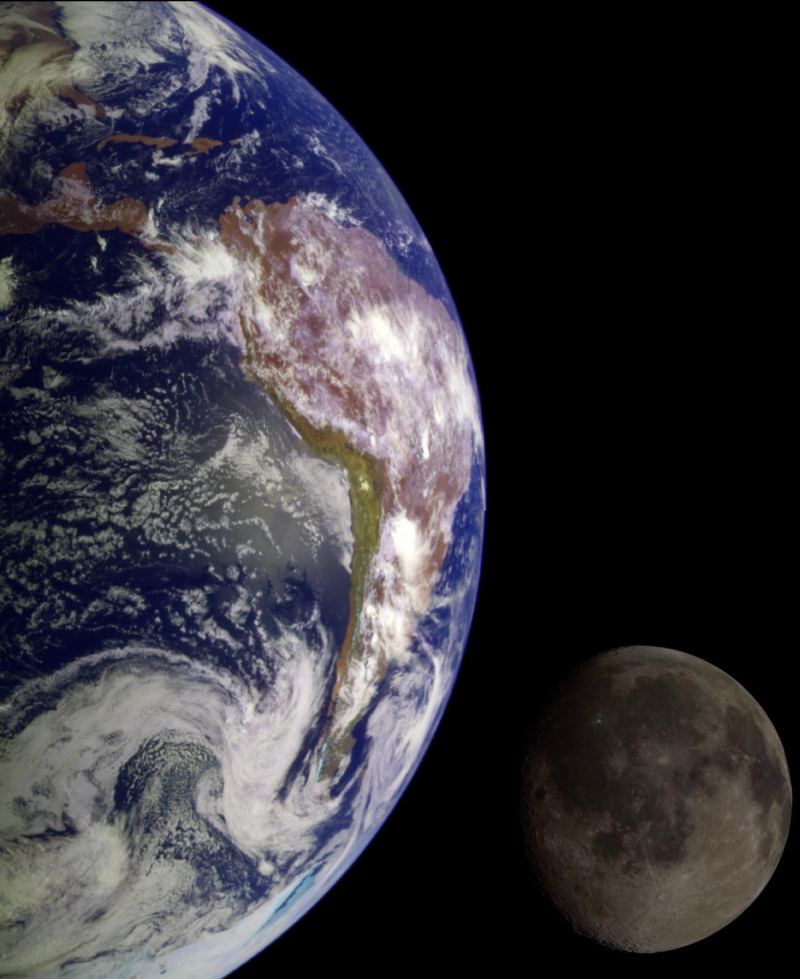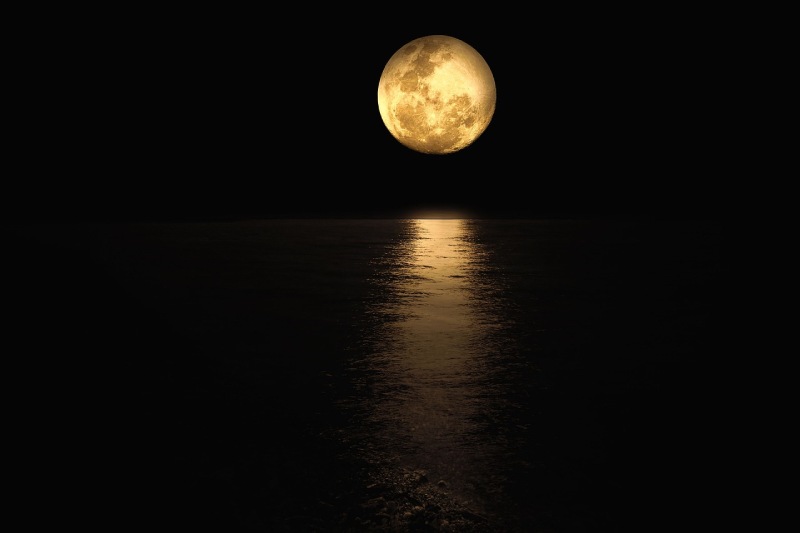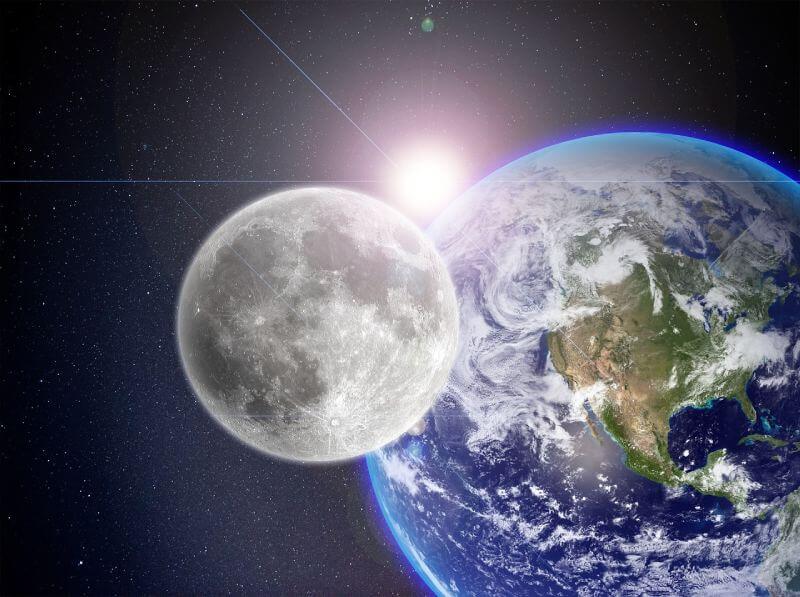The moon has enchanted people for centuries. Thanks to our curiosity, a long history of science and research has occurred to try and unveil its mysteries. The result has been years of research contributed to by scientists all over the world and missions to the lunar surface itself. We have gained a deeper understanding of the moon as Earth’s natural satellite.
As we gaze upon the moon, a question often enters people’s minds regarding a moon-earth collision. Many people rightfully wonder, will the moon crash into Earth? The moon and Earth’s close relationship makes this an intriguing question.
The Moon’s Orbit: Why Doesn’t the Moon Crash into Earth?
As with most things in the universe, gravity plays a crucial role in determining whether the moon will crash into Earth. The moon’s orbit around Earth is a perfect example of gravity and its forces at play. As the Moon and Earth orbit the sun together, gravity keeps the moon at a stable distance from Earth. While the moon orbits the Earth, centripetal force builds up. This force is attempting to fling the moon away. The Earth’s gravity is strong enough to counteract these forces, holding it close. These celestial mechanics, in effect, keep the moon in the Earth’s orbit the same way the Earth is in the sun’s orbit.
Earth is also influenced by the gravitational force of the moon due to its mass. The moon acts as a stabilizer for the Earth, ensuring Earth maintains a consistent axial tilt. This axial tilt provides the Earth with its different seasons and diverse climates. An Earth without the moon could experience extreme climate changes. Some places may experience droughts while others go through ice ages. This could leave certain areas unlivable.
The moon’s influence even controls our oceans’ movement. From the tides to the currents within them, they occur because of the moon. The friction of the ocean currents against the sea floor helps to slow the rotation of our planet and gives us 24-hour days. The moon’s influence on currents also helps to distribute warm water around the globe, helping to regulate the climate. With no moon, there would be no tides and a tremendous impact on both coastal ecosystems and the global climate.
What Would Happen if the Moon Crashed Into Earth?
When asking the question, will the moon crash into Earth, it’s natural to subsequently wonder what the outcome would be. In the hypothetical scenario of a moon-earth collision, the results would be catastrophic. If this event were to occur, the impact would mean the destruction of our planet. It would leave no survivors behind. Based on past interactions within our solar system, an impact of that size would cause the Earth to shatter into pieces. It would send pieces of the Earth and the moon in all directions, leaving nothing but chunks of rocks and dust.

Depending on the speed of this hypothetical collision, there would be significant prior effects. As the moon gets closer to the planet, widespread chaos is likely to occur. For example, if the moon were twice as close to Earth as it is today, it would have a higher gravitational force. This would lead to extreme flooding along coastlines. Streets in cities like New York or Los Angeles would be underwater. The crust of the Earth would succumb to a sudden surge of gravity from a closer moon. Massive earthquakes and volcanic eruptions would ensue.
Even if a single piece of the moon were to break off and collide with Earth, it would lead to a mass extinction event. This would all depend on the size of the piece impacting, although it wouldn’t take much. For comparison, the meteor believed to have struck the Earth 65 million years ago, causing the dinosaur extinction, was 6 miles wide. In contrast, the moon has a diameter of roughly 2159 miles. This difference highlights the destructive potential of an impact from the moon.
Could the Moon Crash Into Earth? Possibilities and Orbital Dynamics
Under the laws of gravity, it is technically possible for the moon to crash into Earth one day. Now the questions of could the moon crash into Earth and will the moon crash into Earth are two different scenarios. Science tells us that a moon-earth collision has a tiny probability. The moon is stable in its orbit, and its gravitational relationship with Earth can’t- and won’t suddenly change. For a change to occur that would make a moon crash possible, there would need to be an external influence.
Another object or event big enough to disrupt the gravitational balance would need to become a factor. Because of the solar system’s age, and Earth’s retrospective location within it, it’s highly unlikely. This object would need to have its own gravitational pull significant enough to disrupt the Earth and Moon’s relationship. An object of this size would likely have to originate from outside the solar system. The chances of this happening are astronomically small.
The Future of Our Moon
The moon has been Earth’s loyal companion for billions of years. As they interact, the Earth also affects the moon. Through these interactions, the moon is moving away from Earth. Believe it or not, this is happening because of the ocean. Tidal bulges occur as the moon impacts the tides. This leads to something called tidal acceleration. The phenomenon is a result of the gravity and momentum of the Earth and its moon.

Scientists estimate that in 15 billion years, the moon will no longer drift away from Earth. Instead, it will maintain its distance. Yet, it’s also estimated that 6-7 billion years from now, the sun will enter its red giant phase. This occurs when a medium-sized star’s core runs out of hydrogen and begins dying. As the sun dies, it will expand in size. The inner planets will probably get absorbed in this process, and the habitable zone will change. When this occurs, the Earth can no longer sustain life as we know it. It’s possible that this event may have enough significance to alter the moon’s orbit in some way.
Final Thoughts: A Possible but Unlikely Collision
The thought of the moon crashing into Earth is scary, and imagination runs wild with it. Will the moon crash into Earth? Scientific evidence explains why this is unlikely to happen. Future changes in the moon’s orbit are relatively predictable, even being measured and studied. Although the ultimate fate of both the moon and Earth is up to the universe, the immediate concern about a moon-earth collision does not exist.
The balance of gravity between the Earth and the moon, and the invisible physics of the universe, render such an event unlikely ever to occur. There’s certainly no impending doom of the moon crashing into Earth, meaning we can continue to appreciate its beauty in our night sky and the contributions it makes to our planet.

